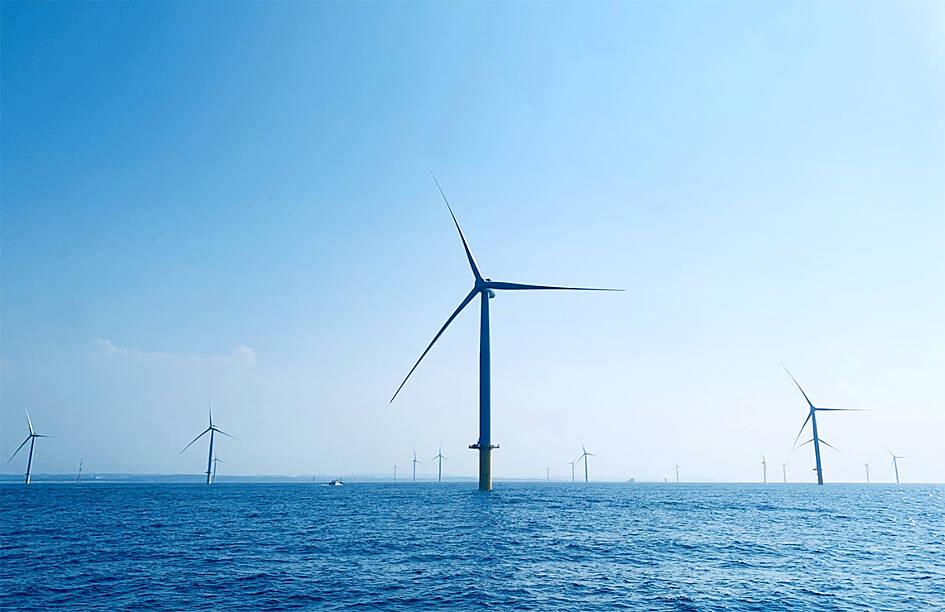UK-based Corio Generation and French-based TotalEnergies, two of the world’s leading offshore wind and renewable energy developers, have signed a joint venture to develop Formosa 3 offshore wind farms in Taiwan, after Japan-based power producer Jera Co put its stake in the project up for sale.
Corio chief executive officer Jonathan Cole welcomed the deal in a statement yesterday, and said the Formosa 3 project should bring economic benefits and jobs to the nation as it endeavors to transition from fossil fuels to green energy sources.
Vincent Stoquart, senior vice president of TotalEnergies’ Renewables Division, touted the partnership as “a new step toward supporting Taiwan’s energy transition, bringing sustainable, low-cost energy.”

Photo: Lin Jing-hua, Taipei Times
Under the agreement, Corio is to be the majority shareholder and lead developer with 50 percent plus 10 shares in the overall project.
“We are thrilled to welcome TotalEnergies as our partner in building offshore wind farms in Taiwan. Our two companies have a longstanding relationship and strong track record in developing projects across Europe and the Asia-Pacific, and so we are absolutely delighted to be working together again in Taiwan,” Cole said.
The Formosa 3 project, comprising the Haiding 1, 2 and 3 wind farms, passed an environmental impact assessment in 2018 with an approved capacity of 2 gigawatts.
The Bureau of Energy in December last year announced that the Haiding 2 wind farm had been awarded 600 megawatts (MW) of grid capacity following the first phase of round three auctions.
“The wind farm development is expected to contribute to Taiwan’s ambitious plans for green energy transition, and represents a multibillion [dollar] investment from the partners and project lenders up to the end of construction,” Corio said in the statement.
“Future investments will be made in proportion to the partners’ project shareholdings,” it said, adding that the agreement must first be approved by government agencies.
Nikkei Asia on Friday last week reported that Jera, which holds a 44 percent stake in Formosa, was pulling out of the project due to “worsening profitability” amid “simmering geopolitical risks around the Taiwan Strait.”
However, a Ministry of Economic Affairs official said that Jera used that public reasoning to cover for its lack of confidence in Formosa 3’s ability to meet investment return expectations.
The official said that Jera might have pulled its other Taiwanese offshore wind farm investments if the political tensions were a legitimate factor.
Jera holds respective 32.5 percent and 49 percent stakes in Formosa 1 (128MW), which began operations in 2019, and Formosa 2 (376MW), which is scheduled to begin operations this year.

DIVIDED VIEWS: Although the Fed agreed on holding rates steady, some officials see no rate cuts for this year, while 10 policymakers foresee two or more cuts There are a lot of unknowns about the outlook for the economy and interest rates, but US Federal Reserve Chair Jerome Powell signaled at least one thing seems certain: Higher prices are coming. Fed policymakers voted unanimously to hold interest rates steady at a range of 4.25 percent to 4.50 percent for a fourth straight meeting on Wednesday, as they await clarity on whether tariffs would leave a one-time or more lasting mark on inflation. Powell said it is still unclear how much of the bill would fall on the shoulders of consumers, but he expects to learn more about tariffs

NOT JUSTIFIED: The bank’s governor said there would only be a rate cut if inflation falls below 1.5% and economic conditions deteriorate, which have not been detected The central bank yesterday kept its key interest rates unchanged for a fifth consecutive quarter, aligning with market expectations, while slightly lowering its inflation outlook amid signs of cooling price pressures. The move came after the US Federal Reserve held rates steady overnight, despite pressure from US President Donald Trump to cut borrowing costs. Central bank board members unanimously voted to maintain the discount rate at 2 percent, the secured loan rate at 2.375 percent and the overnight lending rate at 4.25 percent. “We consider the policy decision appropriate, although it suggests tightening leaning after factoring in slackening inflation and stable GDP growth,”

Meta Platforms Inc offered US$100 million bonuses to OpenAI employees in an unsuccessful bid to poach the ChatGPT maker’s talent and strengthen its own generative artificial intelligence (AI) teams, OpenAI CEO Sam Altman has said. Facebook’s parent company — a competitor of OpenAI — also offered “giant” annual salaries exceeding US$100 million to OpenAI staffers, Altman said in an interview on the Uncapped with Jack Altman podcast released on Tuesday. “It is crazy,” Sam Altman told his brother Jack in the interview. “I’m really happy that at least so far none of our best people have decided to take them

PLANS: MSI is also planning to upgrade its service center in the Netherlands Micro-Star International Co (MSI, 微星) yesterday said it plans to set up a server assembly line at its Poland service center this year at the earliest. The computer and peripherals manufacturer expects that the new server assembly line would shorten transportation times in shipments to European countries, a company spokesperson told the Taipei Times by telephone. MSI manufactures motherboards, graphics cards, notebook computers, servers, optical storage devices and communication devices. The company operates plants in Taiwan and China, and runs a global network of service centers. The company is also considering upgrading its service center in the Netherlands into a